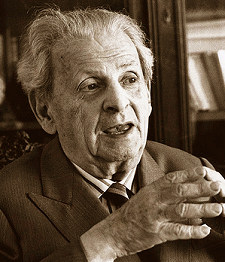Dr. William Greenway, Associate Professor of Philosophical Theology at Austin Presbyterian Theological Seminary, explores the concept of Agape and how it gifts us with, not only personal faith and freedom, but also enlivens the heart with a concern for the flourishing of all creatures.
By the time I published my first “animal rights” essay (“Animals and the Love of God,” The Christian Century, June, 2000), the animal rights movement birthed by Peter Singer’s Animal Liberation (HarperCollins, 1975) and Andrew Linzey’s Animal Rights: A Christian Perspective (SCM, 1976) was already a quarter-century old and encompassed diverse ethical perspectives from many disciplines (for a great representative sampling, see Waldau and Patton’s anthology, A Communion of Subjects [Columbia University Press], 2006). What is distinctive about my contribution to this rich and ever-growing discourse is my attempt to adopt the thought of preeminent Jewish philosopher Emmanuel Levinas in order to articulate a wholly reasonable, essentially (but not exclusively) Christian spirituality that is awakened from the start to infinite love for all creatures. My work does not focus upon non-human others per se. In conversation primarily with Christian testimony and the philosophy of Levinas, I have struggled to discern some essential contours of a wholly reasonable, loving, difference-making faith—and I contend awakening to love for all creatures is an essential part of such faith.
When Sarx asked me to reflect briefly upon the distinctive characteristics of my work, they stressed their appreciation for my emphasis upon grace and displacement of guilt. This is right and significant, so I will briefly sketch how in a neo-Levinasian spirituality guilt is wholly displaced by the dynamics of faith; how all moral/spiritual resolve and action, including even confession of sin and acknowledgement that we emerge from the first part of a fallen (pain and strife-ridden) world, is rooted in awakening to agape; how, while keeping us alive to real-world realities and responsibilities, agape displaces both guilt (a hostility toward self) and blame (a hostility toward others).
Levinas holds that true philosophy begins, before any intending, resolving, or deciding on our part, in awakening (and not hardening our hearts) to having been seized by infinite concern for the flourishing of every other. This precisely describes agape. Following Levinas and Christian scripture and tradition, I identify this from-without, infinite concern for all others by which we find ourselves seized, with God (“God is love”—hardly a claim exclusive to Christianity). To be seized by concern for others is to be seized by agape/God for others. Living surrender to having been seized by infinite concern for every other is living surrender to God is faith (not to be confused with beliefs, ideas concerning faith).
Faith, then, is the gift of agape, the gift of God. This faith in/from God is as reasonable, sure and powerful as our joy over the flourishing of others, and as reasonable, sure and powerful as our horror over the violation of others. Moreover, insofar as we live surrender to having been seized by agape for all creatures, we live ourselves having been seized by agape. That is, we live surrender to a love for ourselves. This is not self-love in the modern, I-centric, selfish sense, but a love from without, a love received for our selves.
Notably, evil is often seen as an obstacle to faith. Levinas helps us realize, to the contrary, that conviction over the reality of agape arises powerfully in the face of violation of others (in the face of evil). Levinas unfolds this dynamic not in terms of a violation of justice (it is not a sense for a system of justice which is offended), but in terms of a violation of agape (I am moved directly by the violation of the one for whom I have been seized by infinite concern).
Paradoxically, then, the reality of agape is powerfully manifest in the most horrific circumstances. In such circumstances, all hope for justice is overwhelmed and lost. In such circumstances we are offended by the very idea anything could compensate/make things right. More generally, the painful and overwhelmingly obvious conclusion that our world is fallen, on the whole unjust, a vale of tears, defeats any reasonable affirmation that existence is just. This sober conclusion does not, however, defeat agape. For, to the contrary, this morally sensitive conclusion depends upon awakening to agape. And while agape keeps us wholly alive to our own harmful actions and the awful realities suffusing this vale of tears, agape primordially and ultimately delivers neither blame nor guilt, for agape is, before and above all, our having been seized by love for every creature, including ourselves.
 These spiritual dynamics are incredibly complex. Here I only note that because agape lives beyond the tit-for-tat economies of justice, then, insofar as we live surrender to having been seized by agape for all creatures, including ourselves (insofar as we live by faith), we live spiritually beyond guilt and blame. Because agape is primordial and ultimate, confession of moral wrong that, after all, appears as wrong only in the light of awakening to agape (which transcends the tit-for-tat, guilt and blame economies of justice), surrender and confession bring only release, deliver forgiveness of self and of others.
These spiritual dynamics are incredibly complex. Here I only note that because agape lives beyond the tit-for-tat economies of justice, then, insofar as we live surrender to having been seized by agape for all creatures, including ourselves (insofar as we live by faith), we live spiritually beyond guilt and blame. Because agape is primordial and ultimate, confession of moral wrong that, after all, appears as wrong only in the light of awakening to agape (which transcends the tit-for-tat, guilt and blame economies of justice), surrender and confession bring only release, deliver forgiveness of self and of others.
Because agape simultaneously unveils evil and transcends it, thereby bringing release from guilt and blame precisely as we frankly confess evil, people of faith emphasize that agape names gracious love, and they give thanks for and live in the light of the transcending, gracious love of God.
Release nowise entails quiescence. To the contrary, insofar as we surrender to agape, we immediately act in the world. Seized by infinite concern for each and every creature—every human, cat, cockroach, daisy—we immediately act to resist every violation and we immediately act to enhance the flourishing of every creature (including ourselves). Living surrender to having been seized by love for all creatures, infinitely alive to every violation but living beyond guilt and blame, wholly moved by agape, we ever strive toward an impossible dream—a dream the ancient Hebrews knowingly cast as eschatological—we ever strive toward a world where the “wolf will lie with the lamb,” where “the lion will eat straw,” where no one anywhere will “hurt or destroy … for the earth will be full of the knowledge of the Lord as the waters cover the sea.”
Dr. William Greenway is Associate Professor of Philosophical Theology at Austin Presbyterian Theological Seminary






